Feature
 Ahmed is part of a growing group of young Asian Americans who are using the lessons they’ve learned in activism, politics and academia to engage their communities.
Ahmed is part of a growing group of young Asian Americans who are using the lessons they’ve learned in activism, politics and academia to engage their communities.
Published August 1, 2019
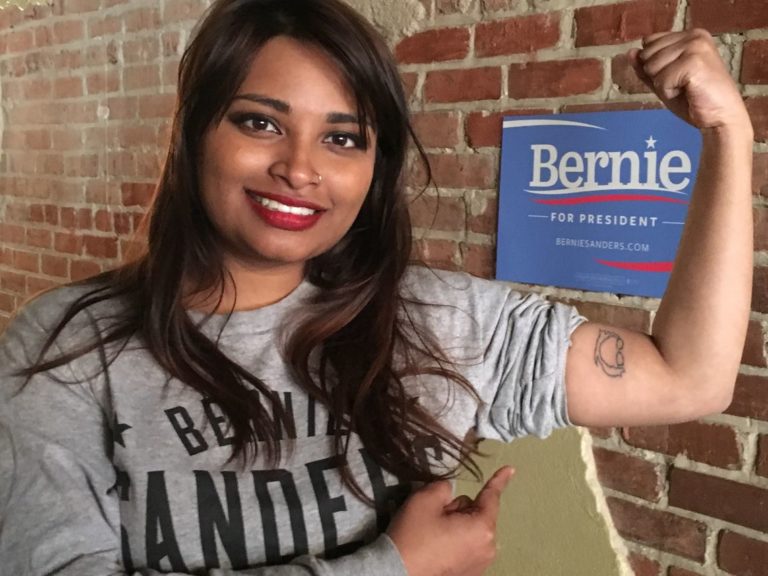
Moumita Ahmed with her Bernie Sanders tattoo. (Courtesy of Moumita Ahmed)
Moumita Ahmed is a political strategist who supports Bernie Sanders and recently organized Bangladeshi voters for Tiffany Cabán’s district attorney campaign in Queens.
Ahmed grew up in a family that rarely discussed politics. In their home country of Bangladesh, politics was “so violent,” Ahmed said. Her grandfather died in the civil war between East and West Pakistan, and to her family, involvement in politics was dangerous.
But growing up in an immigrant, working class, Muslim family in New York after 9/11, “even if we didn’t talk about politics, my life was always politicized,” she said.
Ahmed is part of a growing group of young Asian Americans who are using the lessons they’ve learned in activism, politics and academia to engage their communities. Their goal is to start a conversation with immigrant communities about American politics — a conversation that in many cases begins with talking to their parents. While long-standing research says that parents’ political values highly influence their children’s political identity, in immigrant families, children may often cultivate political values in their parents.
After many long conversations, Ahmed’s parents were finally convinced by her passion. Though they didn’t used to vote, they are now registered Democrats who go to the polls. They even support the candidate they once resisted: Bernie Sanders.
“My mom loves him now,” Ahmed said, adding that her parents have even accepted the tattoo of Bernie Sanders on her bicep.
The generational divide Asian American voters present on many issues has deep ramifications for the electorate, which already struggles to present a unified political identity that either major party can tap into.
Asian Americans are the fastest growing demographic in the country and they are becoming increasingly politically engaged. Their engagement is still less than other demographic groups, but it’s improving, and it manifests in unusual ways, including children inspiring their parents to vote.
More than 11 million Asian Americans will be eligible to vote in 2020, according to the Pew Research Center — more than double the five million who were eligible to vote in the 2000 elections. There were 40 Asian American congressional candidates in 2016, up from only 10 in 2010, according to the 2016 National Asian American Survey. In 2018, the Asian Pacific American Institute for Congressional Studies identified 91 Asian American congressional candidates — more than double from the prior election year.
An average of more than 600,000 new Asian American voters are added each presidential cycle, but large proportions of the electorate don’t identify with either major party. While Asian Americans lean Democratic overall, 2 in 5 Asian American registered voters don’t identify as either Democrat or Republican, according to the 2018 Asian American Voter Survey. There is also a significant fraction of the demographic that lean conservative, including aging anti-communist refugees from Vietnam to a new generation of conservative wealthy immigrants from mainland China, who are critical of issues like affirmative action.
Both major parties put little effort into reaching out to Asian American voters. Nearly half, or 46%, of Asian American voters in a 2018 survey reported no contact from the Democratic Party before that year’s election. The Republican Party fared worse: 54% of voters surveyed reported no contact.
Karthick Ramakrishnan, a professor at UC Riverside who studies Asian American politics, said that the Republican Party’s exclusionary rhetoric toward immigrants is repelling many Asian American voters, but warned that “the Democratic Party cannot take the Asian American voters for granted.”
Not Voting, But Still Political
Before she can worry about politics, Van Chau, 58, of Monterey Park, Calif., must find a job. She has to get her arthritis treated and find money to pay for the x-rays and doctor’s visits she thought her insurance would cover. What complicates everything is that Chau can’t speak English, drive, or understand many of her basic rights.
She spends her free hours watching local Vietnamese TV and radio stations. Her hope is that she’ll catch an advertisement about low-income housing projects or medical assistance from the government.
In a life filled with struggle, without a Vietnamese community around her, voting is a luxury — something that Chau said neither her background or education in Vietnam had prepared her for.
“When I open my eyes in the morning, many things swirl in my head: What I am going to do today, whether or not I will get work, if I can afford to go to the doctor.”
– Van Chau, 58, of Monterey Park, Calif.
Chau’s situation isn’t unique among adult immigrants. Among more than 10 million naturalized foreign born U.S. citizens, 37.3% don’t speak English “very well” and 16.3% households make less than $25,000 a year, according to 2017 census data. These structural barriers isolate a large proportion of the Asian American electorate from the political process.
While voting rates have been increasing for Asian Americans, they remain low relative to most other groups’. Most Asian Americans, and most Asian American registered voters are foreign born. In the last presidential election, AAPI Data found that Asian American citizens had a voting rate of 49%. That’s lower than white and black Americans, who have voting rates of 65.3% and 59.4%, respectively.
But that doesn’t mean people like Chau aren’t political. Though she is a citizen and has never voted, she believes in better protection for workers, an expanded healthcare system and more support for the middle class — ideologies shaped by her own difficult experiences in the country.
Poverty and language isolation aren’t the only barriers to Asian American involvement in U.S. politics.
Ashelee Yang, a PhD candidate in sociology from UCLA, thinks that understanding Asian American immigrants’ political identity begins with examining the history of their home countries. For example, Yang said, if you look at highly educated, well-off Chinese immigrants — those who benefited from the current regime in China — they tend to support Trump, because they want to maintain the privilege they have in the United States. But an earlier wave of Chinese immigrants who fled the totalitarian regime in China might feel completely different.
“They did not leave who they were behind and became a new person in the United States,” Yang said. “They come here with their own identity already or partially established.”
Research shows that parents’ lack of political engagement can trickle down to their children. And young Asian Americans are also less politically active overall than other demographics, Ramakrishnan said.
“Some of it could be the legacy effect of parents not being politically conscious or active,” said Ramakrishnan. “Part of it is also the lack of a strong universal social movement among Asian Americans.”
Politicization Outside the Family
Asian Americans are the least likely of all demographic groups to discuss politics in the home, according to the 2016 National Asian American Pre-Election Survey. Most young Asian Americans become politicized in college through coursework, social movements and activism.
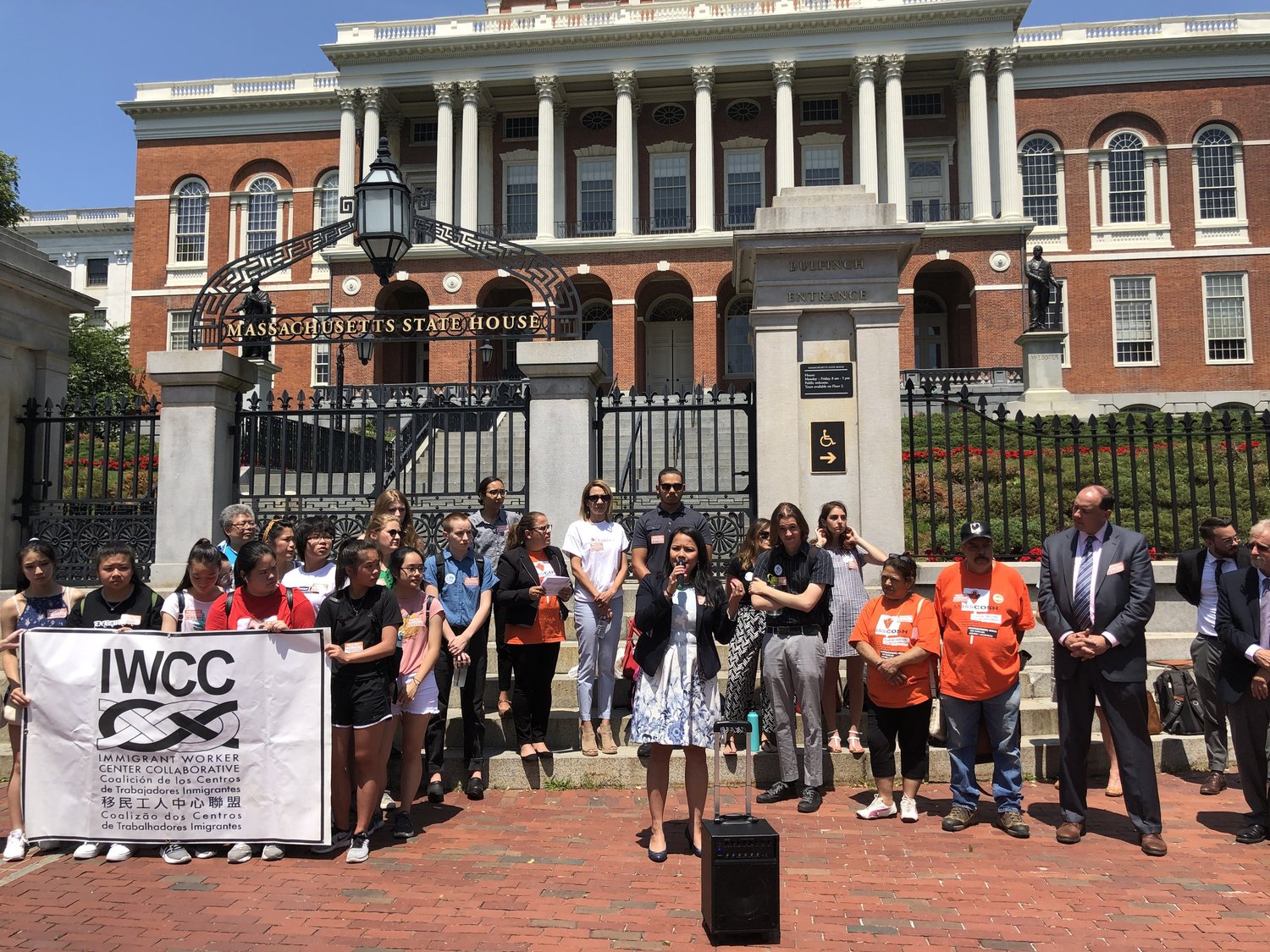
Tram Nguyen speaking outside Massachusetts State House to her constituents. The Vietnamese American is the first in her family to be involved in politics. (Courtesy of Tram Nguyen)
Tram Nguyen, the first Vietnamese woman elected to serve in the Massachusetts legislature, grew up in a family of refugees. Her parents juggled three jobs on top of taking care of Nguyen and her younger sister. They weren’t apolitical, she said — they just didn’t have time to get informed. They didn’t even have time to watch TV.
“So politics was definitely not on the top of their list,” Nguyen said.
Her political education began in college at Tufts University, when she arrived to a campus abuzz with debate about the 2004 presidential election. Her peers passionately identified with Democratic candidate John Kerry or Republican candidate George W. Bush, but Nguyen remembers struggling with basic political questions, like, “What do I register as?” and “What am I excited about?”
“I was not politically informed at all,” she said.
A pre-med student, she found herself bored and unengaged in her classes. She started taking classes in American studies, sociology and psychology that highlighted social injustices and institutional racism.
“In taking those classes, I realize that policies and laws really shape peoples’ lives down to very everyday things,” she said.
She decided to go to law school and became a legal aid attorney. In working with immigrants, low-income families and other pro-bono clients, she saw how often the people most affected by politics were the ones most distant from it — people like her parents.
As a legislator reaching out to the Chinese and Indian immigrants in her district, part of Nguyen’s job is explaining how politics and policy work to affect their everyday lives.
Nguyen attended Lunar New Year banquets at Chinese restaurants and gave a presentation at a Chinese school to reach out to the conservative Chinese American constituency in her district.
And after she was elected, Nguyen drafted a bill to get the South Vietnamese flag recognized as the official flag of the Vietnamese community in Massachusetts.
The yellow flag with three red stripes commemorates the Republic of Vietnam, whose fall in 1975 uncapped a decades-long flow of Vietnamese refugees to the United States. To a lot of Vietnamese Americans, it is a symbol of their lost homeland and an acknowledgement of their pain.
This might not be seen as a pressing issue by the other demographics in her district, but if she wants to reach people like her parents, Nguyen said, she has to speak to the things that the community cares about.
It’s not that immigrants don’t care about politics, Yang said.
“It’s that whenever people talk about politics, they talk about these bigger macro issues instead of focusing on the implications for everyday life,” she said. “You’ve got to talk about politics in terms of relevance to your voters.”
Mobilizing Asian Americans
Kate Zen, 32, grew up watching supervisors treat her mother, an immigrant domestic worker, like a “second-class citizen.”
“It was really easy to politicize me,” said Zen, who is an organizer with Red Canary, a grassroots movement of migrant and immigrant sex workers.
But Zen said the person who inspired her political work — her mother — is still afraid of the repercussions of political engagement. And she notices the same trauma through the Chinese American community she works with in Flushing, N.Y., where many make a living through work that’s been criminalized.
Zen works with immigrants like her mother, who have political worldviews shaped by the “traumatic experience of Chinese totalitarian government.” Sometimes, when she canvasses at events, people are afraid to even touch her flyers.
Asking Chinese immigrants to engage in politics is “a lot to ask,” said Julie Yao, a student at Barnard College who has worked on local campaigns. She also helped organize rallies to protect affirmative action and developed a strategy for talking to middle-aged and older Chinese immigrants. Many Chinese people who immigrated to the United States in the 1980s and 1990s, around the time of the Tiananmen Square protests, continue to experience trauma related to their political experiences in China, she said.
“When I engage with people our parents’ age, I just try to reach out to them from a point of ‘I could be your kid.’”
– Julie Yao, a student at Barnard College.
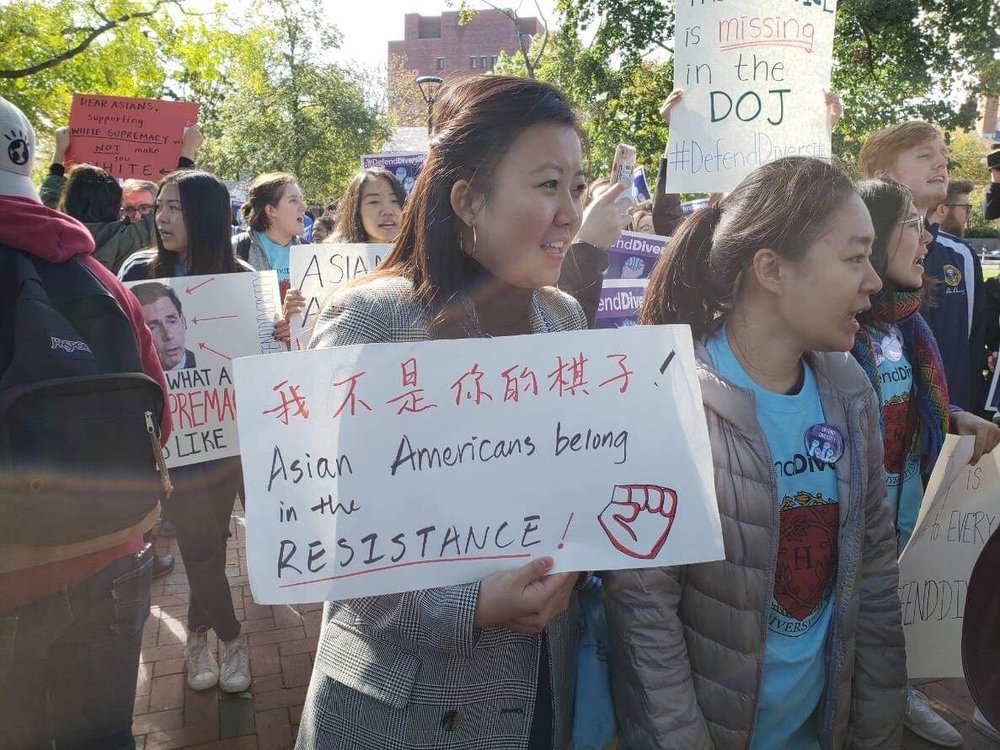
Protesters gather to support affirmative action at Harvard. (Courtesy of Julie Yao)
She tries to use language they can understand to describe issues they aren’t familiar with. For example, in a viral essay in support of affirmative action that she published on WeChat, she began by citing a story about familial sacrifice from the famous 14th century Chinese historical novel, “Romance of the Three Kingdoms.”
Yao wrote that she understood why they were angry, and why Harvard meant so much to them. She shared how her own mother had also purchased the wildly popular Chinese-language child-rearing novel “Harvard girl Liu Yiting” for her. As a kindergartener, she used to tell her grandma that she was attending “Harvard kindergarten.”
She describes how the black civil rights movement laid the groundwork for Chinese immigrants to come to the United States in greater numbers and argues that America’s strength is in its diversity. She explains that freedom is part of the American dream they all seek – including the freedom for students to choose their own lives.
“While competing for rights, we must realize that we are already a member of this new society,” wrote Yao in Chinese. “We are not just Americans, we are Chinese Americans.”
Temple University
Mount Holyoke College
Harvard College
University of Texas at Austin
Feature

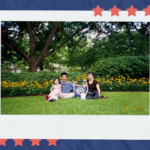


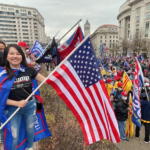
Atlanta 2019



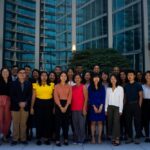
Apply
Become a fellow or editor
Donate
Support our impact
Partner
Work with us as a brand
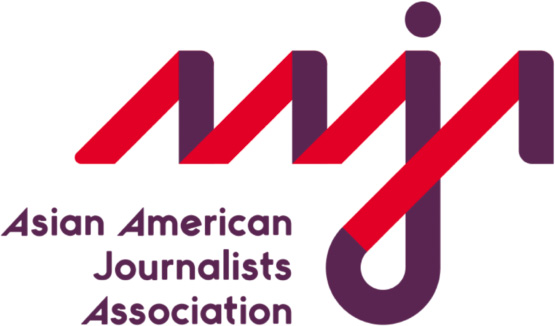
The Asian American Journalists Association (AAJA) is a membership nonprofit advancing diversity in newsrooms and ensuring fair and accurate coverage of communities of color. AAJA has more than 1,500 members across the United States and Asia.